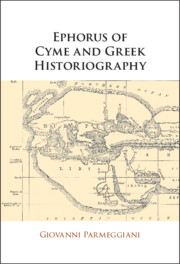4 results
Chapter 4 - Ephorus the Universal Historian
-
- Book:
- Ephorus of Cyme and Greek Historiography
- Published online:
- 30 November 2023
- Print publication:
- 14 December 2023, pp 332-359
-
- Chapter
- Export citation
Chapter 2 - Ephorus’ Histories: The Method
-
- Book:
- Ephorus of Cyme and Greek Historiography
- Published online:
- 30 November 2023
- Print publication:
- 14 December 2023, pp 61-150
-
- Chapter
- Export citation
Chapter 1 - Questions and Answers
-
- Book:
- Ephorus of Cyme and Greek Historiography
- Published online:
- 30 November 2023
- Print publication:
- 14 December 2023, pp 10-60
-
- Chapter
- Export citation

Ephorus of Cyme and Greek Historiography
-
- Published online:
- 30 November 2023
- Print publication:
- 14 December 2023

